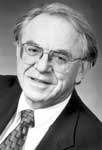|

Interview
with Dr. Herbert Pardes, President, NY Presbyterian Hospital
By
Joan Baum, Ph.D.
He
seems to know everyone–the operative words are “know” and “everyone”–
“know” because Dr. Herbert Pardes has been a distinguished psychiatrist
and department head for so long that he’s developed a sure intuitive
sense of the staff, faculty, and students he meets, and “everyone”
(or just about) because his incredibly extensive résumé indicates
a lifetime of scholarship, medical practice and high-level administrative
appointments.
Two years ago, when he became President and Chief Executive Officer
of the New York Presbyterian Hospital and its Healthcare System,
he assumed one of the most prestigious medical administrative
positions in the country–he’d probably say the world. Referring
to that merger, which took place five years ago (“a smart move”)
when New York Hospital (Weill Medical College of Cornell University)
allied itself with Presbyterian Hospital (Columbia University
College of Physicians and Surgeons), he says he is well aware
of the extraordinary role he plays in advancing biomedical research,
comprehensive high-quality education, outstanding clinical care,
and community outreach. Two minutes in his company and it becomes
clear that the powerhouse union has a powerhouse captain at the
helm, professionally skilled and politically savvy.
The energetic CEO talks fast, without missing a beat, unerringly
picking up his train of thought after having been called to the
phone any number of times. He’s focused, intent, eager to promote
the “rare” if not “unique” complex he heads, a powerful network
that reportedly serves close to 25 percent of the patients in
the New York metropolitan area. He concedes that at least one
reason for the merger was financial–saving money by reducing administration,
but he ardently insists that the essential reason has to do with
providing more and better care. Case in point–Pediatric Cardiology
had been in trouble at Cornell but with the merger the discipline
has grown strong. Case in point–Presbyterian had been weak in
Plastic Surgery but through Cornell has become number one. Summary
of cases in point: in numbers there is strength. Merged major
medical institutions have a lot of “leverage” at the federal,
state and city level.
His priorities? To ensure the continuance of what had begun shortly
after he came to Columbia University College of Physicians and
Surgeons (P&S) as Director of Psychiatry Service in 1984 and
later as dean–the admission of greater numbers of women (approximately
40 percent now) and minorities (8-10 percent). Another is to get
P&S to inch up from being “the 2nd most selective school in
the nation” (Harvard being number one). He also wants to make
sure that education, research and service continue to attract
strong candidates. Aware of criticism about the cynical and venal
twentysomething generation, he counters that the students he sees
are drawn to medicine for “altruistic reasons.” Although Cornell
and Columbia retain separate curricular oversight, Pardes is delighted
that students who come to New York Presbyterian Hospital have
“broad vision” as well as rich training (“a classical pianist
here, a writer there”), though he also wants to make sure that
the new doctors are also caring individuals. His own mentors,
he recalls, were “great teachers,” smart, sensitive to behavior,
encouraging, exciting. He notes that he is particularly supportive
of the Teacher Education Center at Columbia.
Years at the head of the National Institute of Mental Health and
as Assistant Surgeon General of the U.S. Public Health Service
show: Pardes is devoted to advancing research. Forty years ago,
for example, persons with colon cancer were automatically condemned.
Now, because more people are living longer, there is need for
accelerated research into treatment, if not cure. There must be
national policy so that “jewels” such as New York Presbyterian
can continue to shine. He’s concerned about reported impending
cuts to schools and hospital, not only for what reductions will
mean for medical care but for what they may signal to prospective
medical students. Like everyone, doctors want to make a living
and be happy, he points out, a reflection that would sound commonplace
were it not for the fact that it is followed, Pardes-style, with
rapid-fire examples of what makes doctors unhappy: bureaucracy,
bureaucracy, bureaucracy, a disease he feels that is responsible
for the recent slight but telling drop in medical school applications.
He understands the need for confidentiality, for filling out forms
attendant on managed care, but the paperwork is depressingly burdensome–a
conclusion reached by patients as well as doctors, of course,
he might have added.
Dr. Herbert Pardes, psychiatrist and author of, among hundreds
of studies, the well knownbook he authored with Richard Simons,
Understanding Human Behavior, well understands the behavior
of market forces, but he remains confident that he can attend
to both cyclical and essential medical needs. As for his new domain,
“The place is hot,” he says, and it’s obvious that the compassionate
but demanding CEO intends to keep the temperature up, if not rising.#
Education Update, Inc., P.O. Box 20005, New York, NY 10001. Tel:
(212) 481-5519. Fax: (212) 481-3919. Email: ednews1@aol.com.
All material is copyrighted and may not be printed without express consent of
the publisher. © 2001.
|

